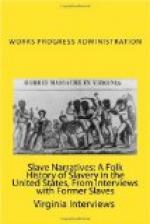Personal interview with Samuel Smalls, ex-slave, 1704 Johnson Street, Jacksonville, Florida
FEDERAL WRITERS’ PROJECT The American Guide, (Negro Writers’ Unit)
Cora N. Taylor
Frances H. Miner, Editor
Miami, Florida
May 14, 1937
SALENA TASWELL
Salena Taswell, 364 NW 8th St., Miami, Fla.
1. Where, and about when, were you born?
In Perry, Ga. in 1844.
2. If you were born on a plantation or farm, what sort of farming section was it in?
Ole Dr. Jameson’s plantation near Perry, Ga. north of Macon.
3. How did you pass the time as a child? What sort of chores did you do and what did you play?
I worked around the table in my Massy’s dining room. I didn’t play. I sometimes pulled threads for mother. She was a fine seamstress for the plantation.
4. Was your master kind to you?
Yes; I was the pet.
5. How many slaves were there on the same plantation or farm?
He must have had about 400 slaves.
6. Do you remember what kind of cooking utensils your mother used?
We had copper kettles, crocks, and iron kettles. “I waited on de table when Lincum came dare. That day we had chicken hash and batter cakes and dried venison.”
7. What were your main foods and how were they cooked?
We had everything that was good (I ate in my Massy’s kitchen) Sweet potatoes biscuits, corn bread, pies and everything we eat now.
8. Do you remember making imitation or substitute coffee by grinding up corn or peanuts?
No, we always had the best of Java coffee. I used to grind it in the coffee mill for my Massy.
9. Do you remember ever having, when you were young, any other kind of bread besides corn bread?
Yes. Batter cakes, biscuits and white bread.
10. Do you remember evaporating sea water to get salt?
No. We did not live so far from Macon and the Ole Doctor he was rich and bought such things. That is how he come to be so rich. He didn’t charge the poor folks when he doctored them, but they would be so glad that he made them well that they kep’ a givin’ him things, bed quilts, chickens, just ever’ thing. Then he had such a big plantation about 200 or 300 acres, but I didn’t live on the plantation. I worked in his home.
11. When you were a child, what sort of stove do you remember your mother having. Did they have a hanging pot in the fire place, and did they make their candles of their own tallow?
My mother did not cook,—she was a special seamstress servant. They had fireplaces on the plantation and they always used tallow candles at the doctor’s place until after the ’mancipation, then the doctor was one of the first ones to buy coal oil lamps.




